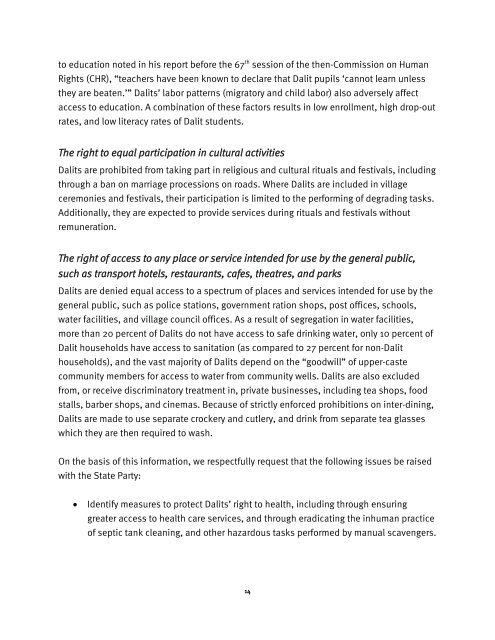Caste Discrimination against India's âUntouchablesâ - Human Rights ...
Caste Discrimination against India's âUntouchablesâ - Human Rights ...
Caste Discrimination against India's âUntouchablesâ - Human Rights ...
You also want an ePaper? Increase the reach of your titles
YUMPU automatically turns print PDFs into web optimized ePapers that Google loves.
to education noted in his report before the 67 th session of the then-Commission on <strong>Human</strong><br />
<strong>Rights</strong> (CHR), “teachers have been known to declare that Dalit pupils ‘cannot learn unless<br />
they are beaten.’” Dalits’ labor patterns (migratory and child labor) also adversely affect<br />
access to education. A combination of these factors results in low enrollment, high drop-out<br />
rates, and low literacy rates of Dalit students.<br />
The right to equal participation in cultural activities<br />
Dalits are prohibited from taking part in religious and cultural rituals and festivals, including<br />
through a ban on marriage processions on roads. Where Dalits are included in village<br />
ceremonies and festivals, their participation is limited to the performing of degrading tasks.<br />
Additionally, they are expected to provide services during rituals and festivals without<br />
remuneration.<br />
The right of access to any place or service intended for use by the general public,<br />
such as transport hotels, restaurants, cafes, theatres, and parks<br />
Dalits are denied equal access to a spectrum of places and services intended for use by the<br />
general public, such as police stations, government ration shops, post offices, schools,<br />
water facilities, and village council offices. As a result of segregation in water facilities,<br />
more than 20 percent of Dalits do not have access to safe drinking water, only 10 percent of<br />
Dalit households have access to sanitation (as compared to 27 percent for non-Dalit<br />
households), and the vast majority of Dalits depend on the “goodwill” of upper-caste<br />
community members for access to water from community wells. Dalits are also excluded<br />
from, or receive discriminatory treatment in, private businesses, including tea shops, food<br />
stalls, barber shops, and cinemas. Because of strictly enforced prohibitions on inter-dining,<br />
Dalits are made to use separate crockery and cutlery, and drink from separate tea glasses<br />
which they are then required to wash.<br />
On the basis of this information, we respectfully request that the following issues be raised<br />
with the State Party:<br />
• Identify measures to protect Dalits’ right to health, including through ensuring<br />
greater access to health care services, and through eradicating the inhuman practice<br />
of septic tank cleaning, and other hazardous tasks performed by manual scavengers.<br />
14

















